Latest in Business News
Get up-to-date business news from our reporters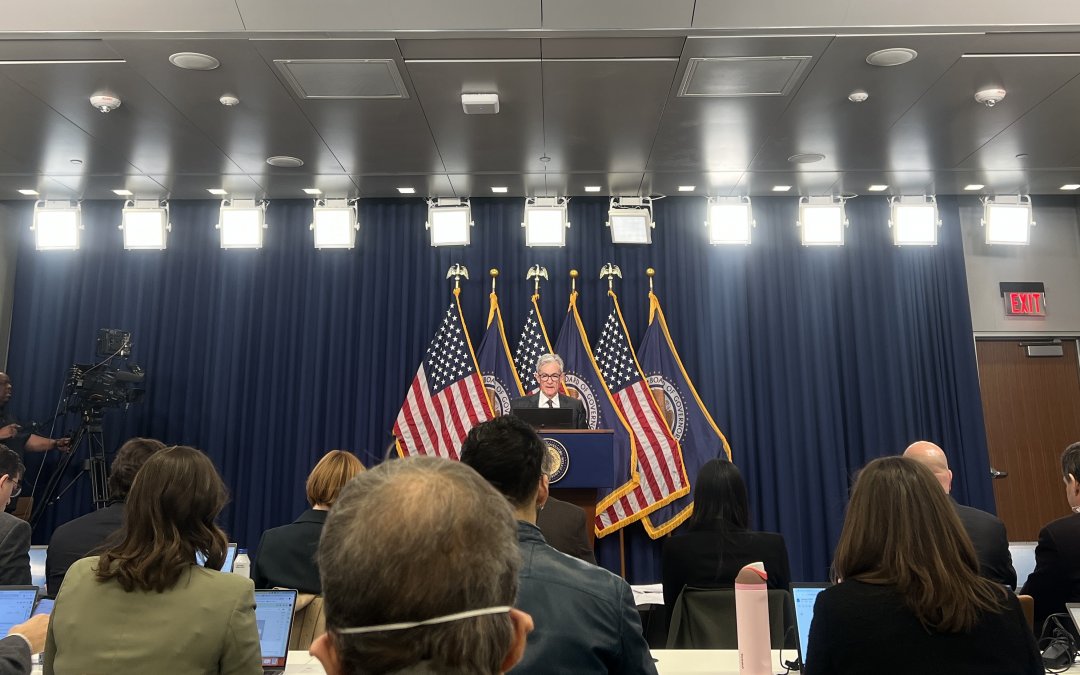
Fed to hold rates steady, entering wait-and-see mode
Federal Reserve stops months of rate cuts after sticky inflation and strong job market.
read more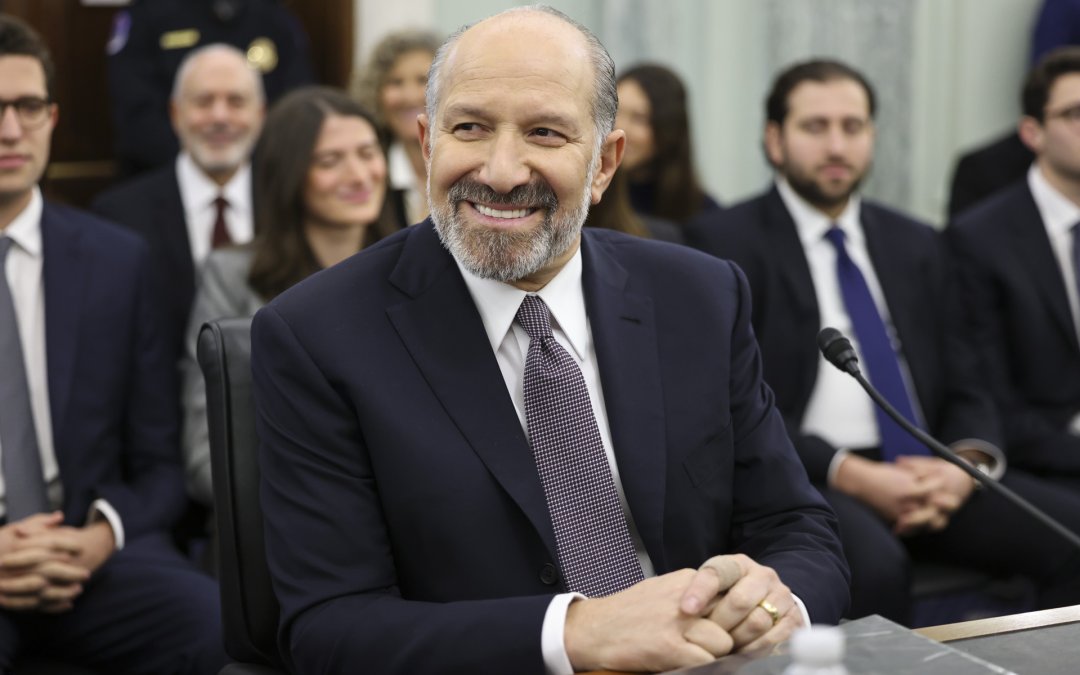
Commerce Nominee Lutnick defends Trump tariffs, promises to divest from business interests
Senators pressed Lutnick on tariff plan, conflicts of interest at confirmation hearing for Secretary of Commerce
read more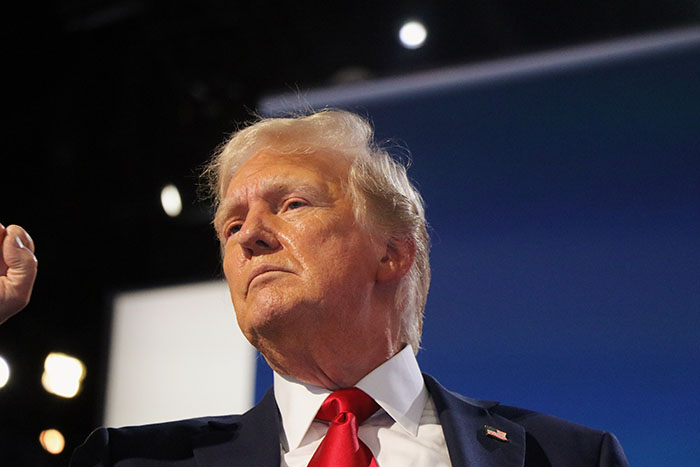
Trump meme coin presents volatile investment alongside ethics concerns
The launch of the token sparks controversy as he assumes office.
read more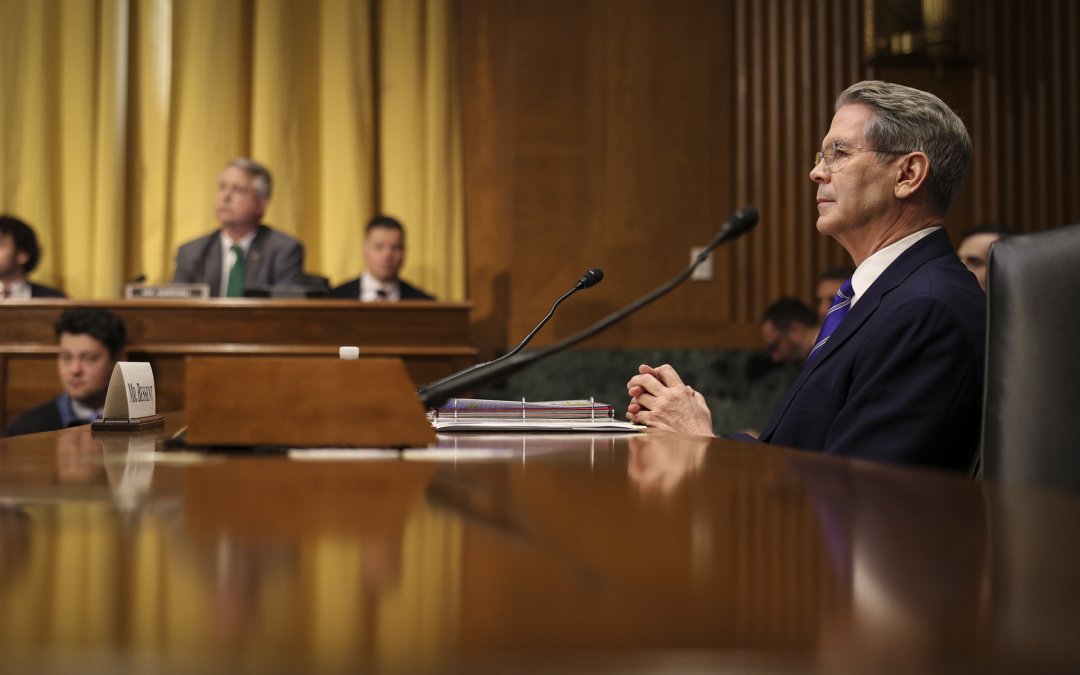
Treasury Secretary nominee Scott Bessent pushes for tariffs and tax cuts during hearing
Secretary of the Treasury nominee promises to deliver on Trump’s economic policies, including tariffs and cutting government spending.
read more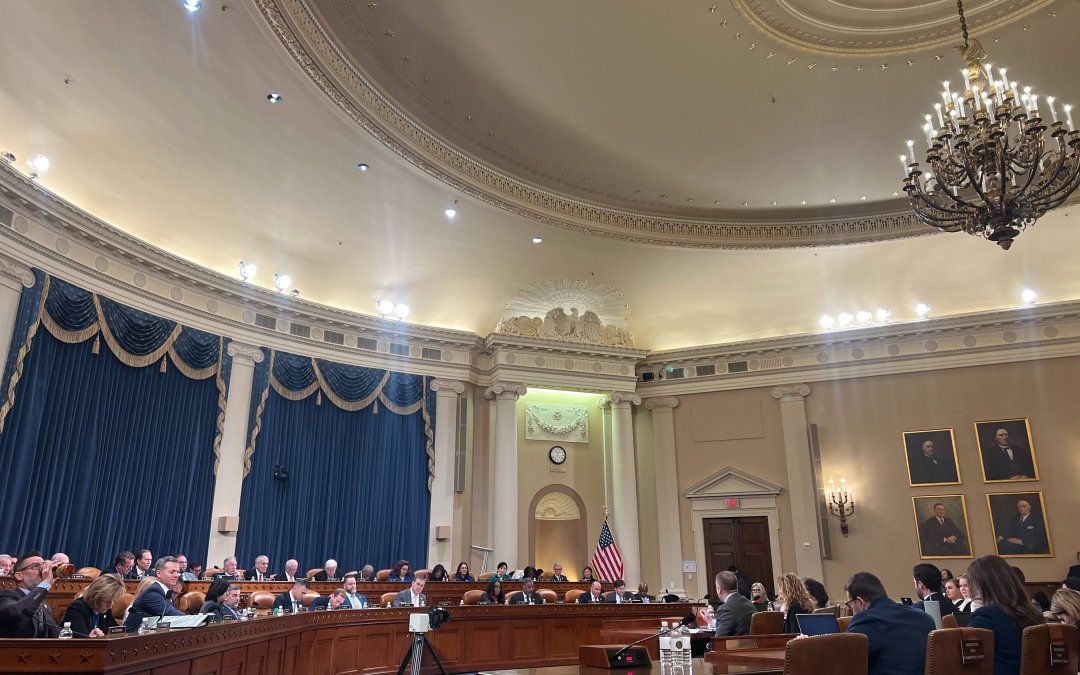
House Republicans advocate for renewal of 2017 Trump tax cuts
House Committee on Ways and Means debate whether renewing the tax cuts will benefit American working-class families and small businesses.
read moreTrump Nominates New FTC Leadership: What’s Next for Antitrust Regulation?
As President-elect Donald Trump’s administration takes shape, the Federal Trade Commission (FTC) is set for a transformative period under newly nominated Chair Andrew Ferguson.
This transition follows the departure of Lina Khan as head of the agency, whose tenure as chair was characterized by a bold interpretation of antitrust laws and heightened scrutiny of major technology companies.
During Khan’s leadership, the FTC pursued aggressive regulatory actions, introduced landmark policies, such as efforts to ban non-compete clauses, and pursued high-profile lawsuits, including a 2023 antitrust case against Amazon, which alleged the company illegally maintained monopoly power through anticompetitive practices. The agency also cracked down on mergers, resulting in the collapse of major deals like Adobe’s acquisition of Figma and Nvidia’s bid for Arm.
“Lina Khan has raised the profile of antitrust significantly,” noted Kevin Yingling, an antitrust partner at Freshfields US LLP and former lead antitrust counsel for global M&A at Google. “She picked up the baton and took a more aggressive and perhaps adversarial approach to M&A compared to the selective enforcement of the first Trump administration.”
The nomination of Ferguson, as well as Mark Meador as a commissioner, suggest a recalibration of the FTC’s priorities under Trump. Ferguson, a Republican commissioner with a reputation for measured conservatism, has signaled he wants to maintain scrutiny over Big Tech, but advocates for a less adversarial regulatory posture. Meador’s addition is expected to solidify the Republican majority on the commission, which could result in a more business-friendly approach to antitrust enforcement.
“Ferguson has made it clear that the tech sector still deserves scrutiny,” said Yingling. “Even with a new administration, there will likely be significant enforcement in the tech space.”
Ferguson vowed to “put an end to Big Tech’s vendetta against competition and free speech,” in a post on X.
The FTC is composed of five commissioners, with a maximum of three from the same political party to balance partisan interests. The chair, serving as the agency’s chief operating officer, plays a critical role in shaping policy and mediating disputes.
William Kovacic, former FTC chair under President George W. Bush, emphasized the importance of this balance.
“The atmosphere depends a lot on how well people get along and how severe their policy differences are,” Kovacic said.
Trump’s nomination of Ferguson, a current commissioner, as chair allows him to take immediate operational control. However, filling the vacancy with Meador requires Senate confirmation, which could take months. During this time, the FTC may operate with a 2-2 partisan split, delaying the Republican majority necessary to fully implement the administration’s agenda.
While broader hostility toward mergers may ease under Ferguson’s leadership, bipartisan interest in regulating Big Tech’s market power is expected to persist.
“The nominees appear to be committed to continuing the FTC’s aggressive oversight of the leading big tech companies,” noted Kovacic. “This means full speed ahead on the FTC’s monopolization cases against Meta and Amazon.”
Ferguson, a former Virginia solicitor general and clerk for Supreme Court Justice Clarence Thomas, has previously dissented from Khan’s regulatory efforts, including proposed bans on non-compete clauses and subscription cancellation rules.
“It’s not a green light for all mergers, but there will likely be less hostility overall,” Yingling said regarding Khan’s expected departure from the chair position. He also suggested that the 2023 Merger Guidelines introduced under Khan could see revisions under the new FTC leadership. These guidelines significantly lowered market share thresholds for presuming mergers as anti-competitive and expanded the scope to include theories of harm beyond consumer welfare.
Gail Slater, Trump’s nominee for the Department of Justice Antitrust Division, may adopt a more tempered approach to these guidelines. “You could see some pullbacks and some tweaks, but I wouldn’t see fundamental changes to them,” Yingling said.
Trump reaffirmed his administration’s commitment to antitrust actions against Big Tech in a Dec. 4 Truth Social post, saying that under Slater’s guidance, the DOJ would persist in prosecuting dominant firms to prevent them from infringing on the rights of Americans and smaller tech companies.
Ferguson’s leadership is expected to involve a nuanced approach to antitrust enforcement.
While the focus on Big Tech’s market dominance will remain, Ferguson’s statements have highlighted a desire to promote competition without stifling technological advancements.
Beyond tech, Ferguson’s leadership may prompt the FTC to prioritize issues in healthcare and agriculture. Consolidation in these sectors, particularly concerning consumer access and costs, remains a bipartisan concern.
Still, Trump’s leadership leaves room for uncertainty. Kovacic emphasized Trump’s mixed signals, noting that he’s “given every indication of wanting to sustain the antitrust program against big tech.” But at the same time, efforts to streamline government budgets under the newly-coined Department of Government Efficiency could impact the agency’s capacity to enforce its broader mandate.
As the antitrust landscape continues to evolve, stakeholders across industries will be closely watching the FTC’s moves under Ferguson’s leadership. With global regulators increasingly coordinating efforts to tackle anticompetitive practices in the tech sector, the U.S. agency’s direction under Ferguson could influence collaborative efforts with counterparts in the European Union and other jurisdictions.
Paul Atkins’ Nomination to SEC Could Carve a Future for Crypto Regulation
Cryptocurrency enthusiasts had reasons to celebrate Wednesday after President-elect Donald Trump tapped crypto advocate Paul Atkins for Securities and Exchange Commission chair—but his approach stops short of offering the industry a free pass.
Atkins serves as co-chair to Token Alliance, a lobbying group and initiative of the Chamber of Digital Commerce. He will replace acting chairman Gary Gensler, who announced his resignation in November and whose aggressive stance towards cryptocurrency defined his tenure at the SEC.
The move signals Trump’s promised pursuit of a deregulatory agenda and a broader shift in Washington’s view of cryptocurrency. But while Atkins may be a friendly face to the crypto industry, agency experts say that his leadership is expected to bring key changes to its regulatory framework.
“It’s not going to be the equivalent of the Audubon for crypto, there will be rules, there will still be police fraud,” former SEC Director of Enforcement and current partner at WilmerHale Bill McLucas said.
“While he’s a conservative, he’s also an institutionalist,” he added.
Well-known on Wall Street and no stranger to securities law, Atkins is currently acting CEO of Potomak Global Partners. If confirmed by the Senate, the new post also would mark his second run at the SEC. Atkins previously served as a Republican commissioner to the SEC during George W. Bush’s administration and he is remembered for his strong free-market views and opposition to corporate penalties—a divergence from Gensler.
Tiffany Smith, partner and co-chair of the Blockchain & Cryptocurrency Working Group at WilmerHale, said she suspected penalties for off-channel communication cases, which is when firms registered with the SEC as broker-dealers do not use required firm communication, to be much lower under Atkins’ commission.
In part, she said, Atkins criticized the impact of corporate penalties, as large fines may ultimately impact the shareholders with no propensity to change firm behavior.
“I think he is going to be more disciplined as to where enforcement resources are spent,” she said.
Probably the most prominent change from Gensler’s commission, McLucas and Smith also added that they expect to see “rulemaking” on crypto from Atkins, whom they said has been “productive in trying to get the SEC to issue [crypto] guidance,” especially regarding his work with tokenization.
Gensler’s commission led a crackdown on cryptocurrencies, bringing a dramatic number of enforcement actions for fraud, scams, and other violations. This type of policing is referred to as “regulation by enforcement,” in which the SEC does not hesitate with enforcement actions where there is an area of regulatory uncertainty.
Gensler’s approach has raised wide concern that he hasn’t provided rulemaking or guidance on whether products charged with registration violations are securities in the first place, prompting critics to label him as an enemy of the crypto industry.
“At times you’ve gotta make decisions that are not” for a “fanbase,” Gensler said about his time at the SEC during a fireside chat at the Healthy Markets Association Conference last Tuesday.
When Atkins takes the reins, it’s expected he will impose clear guidelines. He stated that he thought the SEC should be more “accommodating” and “deal straightforwardly with these various [crypto] firms” on a podcast in February of last year.
Jim Lundy, former SEC enforcement supervisor and current partner at Foley & Lardner, said that Atkins will also want to deal with any circulating registration cases left over.
“I would expect that chair Atkins and the new leaders of the Enforcement Division will scrutinize those investigations very closely,” Lundy said. “In all likelihood, the majority, if not the vast majority, of those investigations are going to be closed.”
Lundy previously served under both former Bush and President Barack Obama at the same time Atkins held Commissioner status.
“He was very well-qualified,” Lundy noted. “He’s someone who has a very sophisticated understanding of the marketplace.”
Lundy added that during his time at the SEC, the staff was “discouraged to pursue regulation by enforcement.” When it came to fraud however, Atkins remained a proponent of enforcement.
“[He] required enforcement to be particular, when it came to violations of the anti-fraud provisions of the federal securities laws,” Lundy said. “That area of SEC enforcement interest, I think, will remain.”
Crypto rally
Nevertheless, Trump’s announcement of Atkins for his top police pick on Truth Social Wednesday was met with loud approval from the crypto community. Following the nomination, the price of Bitcoin surged above $100,000—more than doubling how much it was traded for at the start of this year.
This short-lived rally marked a milestone for Bitcoin, but its momentum quickly faltered as it failed to maintain its position above the $100,000 threshold. However, Bitcoin’s long-term prospects remain bullish with many experts predicting a price surge reaching above $200,000 in 2025.
But Ogle—an advisor for the Trump-backed DeFi platform World Liberty Financial and crypto security expert—said that it might be “wishful thinking.”
The amount of literal cash, he said, required to bid Bitcoin from $100,000 to $200,000 grows exponentially, making each step harder to achieve without significant new liquidity.
Trump is rapidly filling his top posts with top Wall Street crypto advocates, with Atkins joined by CEOs Scott Bessent and Howard Lutnick to the Treasury and Commerce secretary positions, respectively.
The president-elect promised to create a “strategic national bitcoin reserve” at a Bitcoin conference in July. While it’s unclear how many of his promises he will fulfill, Trump has already appointed David Sacks as the new crypto “czar” Thursday, capping last week’s win for the crypto world.
“Trump has a notoriously short attention span, and so it just adds another layer to getting things done,” Ogle said.
Correction: An earlier version of this story said Jim Lundy is a partner at Foley & Gardner. He is a partner at Foley & Lardner.
OpenAI’s prospective shift sparks uncertainty over educational access
For its 200 million weekly active users worldwide, ChatGPT is an invention of convenience. In seconds, the tool can offload hours of menial work in coding, writing and studying, just a few of the product’s many applications.
But as the company behind ChatGPT, OpenAI, bids to become a for-profit corporation for the first time, users are starting to seriously evaluate if they would pay to use the free platform if it becomes paywalled, or worse, riddled with advertisements.
In September, Reuters reported that OpenAI planned to restructure itself from a nonprofit to a for-profit benefit corporation, a break from its founding mission to conduct artificial intelligence research without financial obligations to stakeholders. While this change hasn’t been executed yet, Bloomberg reported last month that OpenAI was in talks with the California attorney general’s office to change its corporate structure.
However, it is unclear how ChatGPT might transform under a new, for-profit OpenAI.
ChatGPT currently operates on a freemium model, offering a free version of its large language model (LLM) that individuals can access with restrictions and caps on the number of times the features can be used. For individuals, there is also the “Plus” plan, which costs $20 a month, and the “Pro” plan, which lists at the significantly heftier price point of $200 a month.
Celia Quillian, a creator who teaches followers how to implement ChatGPT and AI in their lives through her TikTok page @smartworkAI, said she doesn’t anticipate a for-profit OpenAI will alter the free aspect of the freemium model.
“It’s better for them to give something away for free, so that people that really enjoy using it at a higher extent and need those more premium features will trial it, try it, and then upgrade,” Quillian said.
Quillian noted that ChatGPT’s LLM competitors, which include Google Gemini, Microsoft Copilot and Claude, will likely keep many of their features free, putting pressure on OpenAI to continue doing the same.
Angela Virtu, a professorial lecturer at American University’s Kogod School of Business, agreed that ChatGPT will keep a freemium model — but anticipates that OpenAI might raise prices on the premium plans, as well as begin adding advertisements to the free chatbot.
“In my mind, that’s where they would make the most money, because they have all of this knowledge about all the individual users, an unprecedented amount that is going to rival the social networks,” Virtu said.
ChatGPT for education
As the workforce increasingly adapts to using AI tools to aid in various fields, such as legal, health care and consulting work, universities across the U.S. are also making concerted efforts to introduce students to generative AI implementation in schoolwork. For instance, Northwestern University announced it would provide free ChatGPT 4.0 access to students, faculty and staff at the start of the 2024-2025 academic school year.
Virtu said she encourages students to leverage generative AI to brainstorm assignments or debug code.
“If our students don’t get exposure to this technology in school, to start learning the balance and understanding the ethical implementations and responsible use of it, they’re not going to be prepared for the workforce,” Virtu said.
OpenAI also launched ChatGPT Edu in May, a version of ChatGPT built to “responsibly bring AI to campus,” according to OpenAI’s webpage.
Xiaoming Zhai, director of the AI4STEM Education Center at the University of Georgia, said that while he believes ChatGPT Edu is a big step forward for students, parents and teachers concerned about data privacy issues, cost may be hindering OpenAI from tailoring more of their product’s efforts to focus on education.
“I do wish that OpenAI would open some opportunity or program to use their models in school settings. Hopefully that can be free for students, so that it can really make a difference to education,” Zhai said.
Will Tuggle, a junior at George Washington University, occasionally uses ChatGPT to review concepts his professors discuss in class or to generate random trivia questions to quiz his friends. But as a polyglot, Tuggle said he mainly uses the AI chatbot to practice and learn languages — namely Japanese, the language he is currently focusing on mastering.
However, Tuggle believes that utilizing the chatbot alone will not help students to accurately learn the native speech and culture surrounding language.
“If you learn French from a textbook, it’s going to be so formal. But when you go and ask someone a question on the street, they’re not going to speak that way,” Tuggle said. “I think the big thing that the AI is missing is the absence of a listening function.”
While generative AI may not be a fully competent tool to solely support students wishing to learn foreign languages, Tuggle believes that ChatGPT’s integration into education is generally positive. However, he is uncertain about whether he would ever pay for access to ChatGPT’s more premium features in light of the for-profit restructuring.
“It’s a great tool to use, but it’s not the end of the world if it becomes less accessible to everyone, because there are still so many great resources out there,” Tuggle said.
SCOTUS justices appear divided over upholding federal fraud charges
WASHINGTON– Supreme Court justices appeared split over whether to uphold a federal mail and wire fraud conviction Monday, questioning a Pennsylvania-based construction business’ misrepresentations in using federal funding.
Stamatios “Tom” Kousisis and his company Alpha Painting & Construction Company, Inc. were awarded state money to work on Philadelphia-area projects in 2009, with the understanding he would utilize contributions from disadvantaged business enterprises (DBE’s), as part of a federal program meant to advance diversity.
Kousisis had agreed to buy paint supplies from Markias, Inc., a registered DBE. However, he instead chose to use Markias as a checkpoint, buying the supplies from another, non-DBE company. Kousisis completed the projects, but broke the DBE regulatory requirements, submitting false documentation to make it appear that he was complying with them.
Kousisis and his company were convicted in a district court for charges of wire fraud and conspiracy to commit wire fraud in 2018, which the defendant then appealed. His convictions were upheld in 2023, prompting the defendant to appeal to the high court.
Jeffrey Fisher, on behalf of the petitioner, presented a three-fold argument against the charges, most notably arguing the government’s application of the fraud statutes is too far-reaching.
Fisher asserted that because the government’s argument is about a breach of the Pennsylvania Department of Transportation’s interests and not about money, then it does not satisfy common law requirements for fraud– which holds that a scheme to harm a traditional property interest is proof.
The court’s conservative wing appeared skeptical of applying the fraud statutes more widely, with several of them discussing the implications of upholding the conviction.
“The tricky part for the government is, if there is no injury requirement, then every material misrepresentation that results in no injury to anyone becomes a federal crime,” Justice Neil Gorsuch said.
Many discussions also revolved around the nature of the exchange in the case, and whether Kousisis had provided a service of lesser value than the money he received through his actions.
However, Gorsuch challenged the notion, and the U.S.’ application of “materiality” in the case– a concept which Miriam Baer, Vice Dean and Centennial Professor of Law at Brooklyn Law School, says comes up often. Baer says materiality reflects on whether a misrepresentation “undermines the purpose of the deal.”
Feigin contended that the DBE agreement was essential to the agreement between Pennsylvania’s DOT and Kousisis’s company, something he called the “essence of the bargain” and that materiality should be the grounds for confirming the conviction.
But, Gorsuch said the concept’s application “has never been that high of a bar.”
“You seem to be try to make it a little higher here by really importing, the benefit-of-the-bargain idea with respect to individual items that can sometimes give rise to injury even when you’re given a thing of equal value,” Gorsuch said to deputy solicitor general Eric Feigin, who represented the U.S.
Justice Brett Kavanaugh seemed to push back on another part of the government’s argument– that overturning the conviction would be “highly destabilizing.” When Feigin said he could not provide a specific number of cases of a similar nature prosecuted, Kavanaugh questioned how he could assert an overturned conviction would cause destabilization.
Chief Justice John Roberts and Justice Samuel Alito also sought a response from Feigin on the idea of over-federalization of fraud cases– that many of them should just be decided in lower courts.
“A lot of these things could be dealt with under state law, and you don’t have to federalize every jot and title in a large contract,” Roberts said. “We’ve expressed in many precedents that the federalization of something as simple as nuances of contract law, it’s a very serious matter.”
Justices from the court’s liberal wing, on the other hand, seemed to take special interest in the nuances of misrepresentation in the case, particularly as a tactic Kousisis employed to obtain the contracts.
“You have these folks, your clients, understanding the materiality of this so much so that they concoct a scheme whereby they misrepresent the extent to which they really are relying on such DBE subcontractors,” Justice Ketanji Brown Jackson said to Fisher. “I don’t understand why, given our just classic understanding of fraud being deceit with the object of obtaining money or property, why this doesn’t count.”
However, Fisher held steadfast to his argument on the necessity of monetary or property harm in his responses. He also argued that getting money through misrepresentation does not qualify as fraud based upon previous decisions by federal courts in Arkansas and Kansas.
“There can be extravagant lies and — and whopping tales that are told,” Fisher said to Justice Clarence Thomas. “it can be tempting to want to punish that person, but unless there’s harm to the property interest involved, there’s no case”
Legal experts say a look at the court’s recent history might signal how they’ll rule.
“You start to see the Supreme Court and some other lower courts start to say this statute is too broad, and it’s providing too much discretion to federal prosecutors,” says Miriam Baer, Vice Dean and Centennial Professor of Law at Brooklyn Law School. “It’s kind of criminalizing everything that relates to deception, and not everything that’s deceptive should be falling under the mail and wire fraud statute.
The narrowing of how property and fraud are defined was taking shape in older judgments, such as with Cleveland v. United States (2000), where the court, then only having one current Supreme Court justice in Clarence Thomas, said that state and municipal licenses do not count as property.
Another case of interest is Ciminelli v. United States (2023) according to Todd Haugh, Associate Professor of Business Law and Ethics at Indiana University. In that case, the government decided whether the “right-to-control” theory, which the U.S. government is employing in their argument in Kousisis, is viable grounds for federal fraud charges.
Haugh says the theory as applied means, “because of how [someone] defrauded me, or the fraudulent statements that they made, they have made it so I can’t do the business that I want,” In Ciminelli, the high court ruled against the government by unanimous decision.
Alito seemed to express reservations along the same line.
He said that looking at recent rulings, you’d find “the Court really doesn’t like the federalization of white-collar prosecutions and wants that to be done in state court and is really hostile to this whole enterprise.”
The court will hand down their decision next summer.
Fed’s Barr Commits to Full Term Amid GOP Calls for Regulatory Pause
WASHINGTON – Michael Barr, Vice Chair of the Federal Reserve, reaffirmed his intent to serve his full term during a heated House Financial Services Committee hearing on Wednesday.
The session was marked by Republican criticism of Biden-era financial regulations and calls for a pause in rulemaking until president-elect Donald Trump takes office.
Barr’s remarks came amid repeated questioning from lawmakers about potential interference with the Federal Reserve’s autonomy. Citing the fixed terms of office established for Federal Reserve officials, Barr echoed Chair Jerome Powell’s defense for the Board’s independence from the Federal Open Market Committee (FOMC) meeting earlier this month.
“As Chair Powell said, we serve fixed terms of office, and I intend to serve my fixed term office,” Barr stated, pushing back against suggestions that Trump might attempt to remove or demote Federal Reserve officials.
Committee Chair Patrick McHenry, R- N.C., set the tone for the hearing with sharp criticisms of the regulatory approach under the Biden administration. He argued that current policies are overly restrictive, backward-looking and detrimental to innovation in the financial sector.
“We need regulators who are forward-thinking, not stuck fighting the last war. The financial system of the future demands innovation, not obstruction,” McHenry said.
The hearing also included scrutiny of Federal Deposit Insurance Corporation (FDIC) Chair Martin Gruenberg. Gruenberg is expected to step down on Jan. 19 in light of a May report detailing toxic workplace culture at the FDIC. The chair faced scathing criticism and demands for immediate removal in the report’s aftermath.
“What really disturbs me is why chair Gruenberg, after six months ago, when you said you were going to resign, why are you still here?” asked Rep. Monica De La Cruz, R-Texas.
Republicans framed their broader concerns about financial regulation as a plea for stability ahead of Trump’s inauguration. Led by McHenry and his likely successor Rep. Andy Barr, R-Ky., they pressed regulators to avoid implementing significant new rules during the transition period.
Rep. Zach Nunn, R-Iowa, specifically requested confirmation that regulators would halt what he termed “burdensome and overreaching regulations.”
Barr acknowledged that while some routine tasks would continue, major new regulatory initiatives would likely be deferred until Trump’s appointees were in place.
“We all have other rulemakings that are routine business, like data collection or requirements related to combating elder fraud,” Barr said. “But on the major rulemakings that people are focused on, I plan to wait until my colleagues join.”
Barr specifically referenced three key interagency rulemaking initiatives concerning capital, liquidity, and long-term debt. “I look forward to working with my new colleagues at the OCC on those priorities,” he added.
Barr emphasized the importance of finalizing Basel III capital rules in the first half of 2025, citing their role in raising capital standards and addressing risks highlighted by the global financial crisis and recent banking sector stress.
“It’s important to finalize this process to ensure resilience across the financial system,” Barr said, adding that the rules would incorporate lessons from March 2023 by requiring banks to account for unrealized losses on their balance sheets.
Senators scrutinize Visa and Mastercard over transaction fees
WASHINGTON – A bipartisan group of senators grilled Visa and Mastercard executives in a Judiciary Committee hearing Tuesday, revitalizing Washington’s efforts to inject competition into the credit card industry.
Retailers pay a fee when consumers make a purchase with a credit card, which is usually about 2% of the purchase, according to the National Retail Foundation. Congress has long been critical of these swipe fees; in 2010, it passed the Durbin Amendment, which capped similar charges for debit card transactions.
Tuesday’s hearing was the first major Congressional action directed at swipe fees since senators — including committee chair Dick Durbin (D-Ill.) and Vice President-elect JD Vance (R-Ohio) — introduced the bipartisan Credit Card Competition Act last year. The CCCA would direct the Federal Reserve to require large banks to provide retailers with options for credit card processing, lowering operating costs for businesses.
During the hearing, senators on both sides of the political aisle were critical of Visa and Mastercard, which together account for about 70% of credit cards, according to Motley Fool Money.
“You are killing small business in the United States of America,” Sen. Peter Welch (D-Vt.) told representatives from both companies.
Proponents of the CCCA argue that Visa and Mastercard dominate the industry and impose high swipe fees that obstruct business and hike prices for consumers. CMSPI, a payment consultant group, estimates that the proposed legislation could save retailers and consumers $16.4 million annually.
Even some fiscally conservative senators have thrown their support behind the CCCA.
“I’m a hands-off, free market capitalist,” said Sen. Roger Marshall (R-Kan.), an original co-sponsor of the CCCA. “But capitalism without competition leads to unchecked greed, the exploitation of hard-working Americans and the erosion of opportunity.”
Linda Kirkpatrick, president of the Americas at Mastercard, touted a common defense of the swipe fees: credit card rewards programs. She said that many Mastercard rewards programs were drastically reduced or cut when Europe capped swipe fees at 0.3%.
Alternatively, Professor Roger Alford of the University of Notre Dame Law School cited a Federal Reserve study, which found that credit card rewards programs redistribute wealth to benefit richer, low-minority areas.
“Increasing rewards programs do not have the same broad distributional benefits as reducing the cost of goods and services,” Alford said. “If pass-through happens on both sides, then the trade-off of reducing the price of groceries for every American may be worth fewer benefits to premium card holders at the airport lounge.”
Kirkpatrick and Bill Sheedy, a senior advisor to the CEO of Visa, also argued that their companies made payment more convenient for small businesses and invested in security technology to protect consumers and retailers.
In response, Welch argued that security did not justify “rip-off prices.” He also pressed Kirkpatrick and Sheedy on why large companies like Walmart were able to negotiate deals on swipe fees, while small business owners had no choice but to accept their rates.
The CCCA has stalled in committees in both chambers of Congress since it was introduced in 2023. Sen. Thom Tillis (R-N.C.), who said he does not support the CCCA, acknowledged that the bill would not pass in the current Congress.
However, he said Congress is in tune to the problems facing small businesses and consumers. He added that if the industry does not address their concerns, Congress will likely pass the bill within the next three years.
“Get in a room and solve it because I’ll guarantee the solution coming from Congress will not be good for anyone,” Tillis said.
Supreme Court grapples with Nvidia’s bid to avoid securities fraud case
WASHINGTON — The Supreme Court raised concerns Wednesday about the technical complexities required to issue a ruling on a securities lawsuit against Nvidia Corp. and CEO Jensen Huang for allegedly misleading investors on its cryptocurrency sales ahead of a crash.
Nvidia (NVDA) took a dive Wednesday morning and remained down 1.36% at U.S. market close on the Nasdaq.
The nine justices were faced with deciding whether a 2018 class-action, led by Stockholm-based investment firm E. Ohman J:or Fonder AB, satisfied standards under the Private Securities Litigation Reform Act (PSLRA). Nvidia claimed the suit to be “frivolous,” due to the plaintiff’s lack of particularity in their reliance on an expert opinion that points to undisclosed internal documents.
Litigation for securities regulation remains at the top of the agenda. The case is one of two securities fraud cases argued in high court this term — a rare number for a single term. The other case, argued last week, was a multibillion-dollar Facebook lawsuit brought by Meta shareholders over data breach risks. This year, the Supreme Court’s conservative supermajority has made several key rulings that weakened the power of regulatory agencies to regulate big businesses.
The Facebook and Nvidia cases present the court with how to handle corporate transparency, this time with the scope of private securities actions at stake. Ten former Securities and Exchange Commission officials backed the lawsuit, stating in an amicus brief that the complaint contained sufficient fraud allegations which the high court should uphold.
Though the Supreme Court has taken a pro-business stance with past rulings, many of the judges, both liberal and conservative, appeared skeptical of the argument presented by the attorney for Nvidia, Neal Kumar Katyal.
Katyal compared the stakeholder complaint to “cotton candy,” saying “it seems like a lot” but is “all fluff,” and claimed that the expert opinion used by the plaintiff does not fulfill particularity standards under the PSLRA.
“It’s becoming less and less clear why we took the case and why you should win it,” Justice Elena Kagan said.
“It seems like you’re asking us to engage in a type of analysis that we’re not very good at,” she added, echoing sentiments from her colleague, Justice Samuel Alito, on how the court should handle a case requiring highly technical expertise.
The expert opinion was provided by Prysm Group, an economic consulting firm. In the complaint, Prysm said that Nvidia, one of the world’s leading producers of graphic processing units (GPU’s), understated its “crypto-related GPU sales by $1.126 billion” between 2017 to 2018.
Nvidia’s GPU’s are primarily marketed for computer functions, like video games, but can also be used in cryptocurrency mining. At the beginning of 2018, Nvidia saw revenue in GPU sales increase, then fall later the same year around the time of the crypto decline, ultimately leading to a steep drop in Nvidia’s share price. CEO Jensen Huang attributed this to a “crypto hangover.”
The results found by Prsym led investors from the Swedish-based firm to accuse Nvidia of knowingly concealing the extent of the company’s reliance on cryptocurrency in violation of the Securities Exchange Act of 1934.
Although the Northern District of California dismissed the complaint twice due to insufficient evidence of intent (scienter), the Ninth Circuit partially reversed, allowing claims against Nvidia and Huang to proceed.
In 2022, Nvidia agreed to a $5.5 million SEC penalty for inadequate disclosures related to cryptocurrency demand. The respondents pointed to proprietary information acquired by the SEC as a potential source to shed light on Huang’s intent to mislead shareholders.
Arguments from both sides prompted broader concerns from Chief Justice John Roberts as the court wrestled with interpreting the Private Securities Litigation Reform Act, noting, “Positions on both sides are a little too absolute. How do you find the sweet spot in terms of the PSLRA?”
“The PSLRA was raising the bar. The idea of having variable levels of particularity is difficult to apply, and the statute is not doing what it is meant to do,” Roberts added.
Atlantic Legal Foundation Executive Vice President & General Counsel Lawrence Ebner, who filed an amicus brief in support of the petitioner, said “due process in the Private Securities Act is meant to protect corporate defendants from meritless securities fraud complaints.”
On the other hand, Justice Ketanji Brown Jackson voiced concerns that high evidentiary standards could hinder plaintiffs.
“I guess my concern is that you appear to be requiring plaintiffs to actually have the evidence in order to plead their case,” Jackson said, noting that critical evidence is often only uncovered in later stages of litigation.
Plaintiffs further argued that private securities litigation serves “as a supplement to public enforcement to ensure that our capital markets are the best in the world.”
California-based attorney Thomas Ogden, who filed an amicus brief in support of the respondents, warned that stricter standards would “completely kill the ability to have an expert come in, write up a declaration and a report, and, you know, speculate what the company must have known,” undercutting plaintiffs’ ability to build their cases.
A decision for the case, NVIDIA Corp. v. E. Ohman J:or Fonder AB, is expected by summer.
Fed cuts rates, Powell emphasizes independence as Trump administration looms
WASHINGTON – The Federal Reserve cut interest rates by 0.25% at its Nov. 7 meeting, with Federal Reserve Chair Jerome Powell underscoring the central bank’s commitment to its dual mandate and reinforcing its independence in response to potential political pressures from the incoming Trump administration.
Powell detailed the Fed’s focus on inflation, labor market stability, and rate guidance while avoiding direct engagement with questions on Trump’s possible influence over future policy.
The 0.25% rate cut underscores the Fed’s focus on balancing inflation control with labor market resilience.
“We are committed to maintaining our economy’s strength by supporting maximum employment and returning inflation to our 2% goal today,” Powell stated, signaling the Fed’s cautious stance.
The decision reflects recent economic data, with payroll growth slowing, unemployment rising to 4.1% and wage growth easing. Despite these shifts, Powell expressed confidence in the Fed’s “appropriate recalibration” to stabilize inflation while sustaining economic growth.
Facing questions about his own future under Trump, who has been critical of Powell, he firmly asserted that he would not resign if asked by the President-elect and stating that such interference is “not permitted under the law.” The response underscores the Fed’s statutory independence.
Powell made clear that the Fed’s decisions are driven by economic data rather than political considerations. “Our actions affect communities, families, and businesses across the country,” he remarked, reinforcing a commitment to economic stability.
Powell stated “In the near term, the election will have no effects on policy decisions,” and avoided speculating on how Trump’s potential policies might influence the economy.
“We don’t guess, we don’t speculate, we don’t assume,” said Powell. However, he acknowledged that over time, such policies could have economic effects that might influence the Fed’s pursuit of its dual mandate.
“We are prepared to adjust our assessments of the appropriate pace and destination as the outlook evolves,” he stated, indicating that the Fed stands ready to adjust its approach based on evolving conditions.
Powell also addressed long-term fiscal sustainability, warning that the U.S. federal deficit is “on an unsustainable path” and poses risks to economic health. In addition, he acknowledged elevated geopolitical risks but noted that the U.S. economy has shown resilience in the face of these challenges.
Uncertainty around the scope of executive influence over the Fed remains a likely focal point as Trump takes office, especially given his hints at potential new appointments and his vocal criticism of the current chair. Powell, avoiding direct remarks on his reappointment, underscored the importance of legal protections that secure the Fed’s independence.
Changes in Fed leadership could prompt policy shifts, introducing further unpredictability for businesses and investors.
Looking forward, Powell affirmed the Fed’s commitment to data-driven decisions, emphasizing that it would continue responding to economic indicators over political influence.
The next Federal Reserve interest rate announcement, along with updated economic projections, is scheduled for Dec.18.
“Trump Trade” soars in aftermath of Tuesday’s elections
WASHINGTON – U.S. stock futures soared to record highs Wednesday in response to Donald Trump’s win in the battle against Vice President Kamala Harris for president.
The Dow Jones Industrial Average rose 3.4%, or around 1,430 points, around 1:50 pm EST, notching an intraday peak Wednesday afternoon in New York. Additionally, the Nasdaq composite picked up momentum and gained 2.6%, while the S&P 500 gained around 2.3% in afternoon trading. Most impressive was the small-cap Russell 2000 climbing over 5% with no sign of falling yet, all according to Marketwatch.
“Interpretation is that markets are pricing a more pro-business attitude,” former IMF Research Department Deputy Director and current Brookings Senior Fellow Gian Maria Milesi-Ferretti said.
With Donald Trump’s return to the White House and a new Republican Senate Majority, investors and financial professionals are rallying around the so-called “Trump trade” in hopes for a less aggressive regulatory climate. Trump has repeatedly said tax cuts and tariffs are at the top of his economic agenda, likely causing investor flurry to position themselves aligning with his second term.
“All of these things would contribute to, in different ways, boost domestic demand, boost firm profitability, reduction in taxes for specific industries,” Milesi-Ferretti said.
Financial and bank stocks led the Dow Wednesday, with JPMorgan Chase (JPM) and Goldman Sachs (GS) topping the index.
Milesi-Ferretti said with “stock markets” prices looking so “generous,” it’s “healthier to take a long-term perspective.”
“With valuations being a large multiple of earnings, the possibility of downward corrections is clearly there based on historical patterns,” he said.
In other market moves, stocks in oil and solar energy shares fell, with the Wilderhill Clean Energy Index dropping as much as 6.4%.
The Biden administration has taken ambitious climate action with the Inflation Reduction Act of August 2022, investing hundreds of billion dollars in implementing clean energy provisions.
Attitudes towards clean energy will likely shift under Trump’s presidency, who has long criticized climate policies as the “green new scam,” and has even indicated plans for specific tariffs that will affect the industry.
“That will lead me to expect an attitude which is less likely to discourage the production of fossil fuels,” Milesi-Ferretti.
Following the presidential election on Tuesday, stock and bond markets are sure to see major moves with the 30-Year Treasury Bond Auction on Wednesday afternoon and the Federal Reserve decision on cutting interest rates on Thursday. Under Trump, a stronger fiscal policy is expected, which may have risks for inflation rising.
This is apparent with bond yields climbing Wednesday, and the 30-Yield Treasury Bond climbing to 4.60%, its biggest daily climb in two years.
Milesi-Ferretti said that bond yields “still remained within the bounds.” Market sentiment reflected a “short-run reaction” and the big problem still lies in “unpredictability,” he said.
“We’re going to have to see how markets react once specific legislations are passed or not passed,” he said.
Correction: A previous version of this story misquoted Milesi-Ferretti. He referred to a boost in “domestic demand,” not “home estate demand.”
Correction: A previous version of this story misspelled Milesi-Ferretti’s name.
Supreme Court questions risk disclosure arguments in Facebook case
WASHINGTON – The Supreme Court appeared skeptical that companies should be required to include past events in their risk disclosure statements during oral arguments for Facebook, Inc. v. Amalgamated Bank Wednesday.
The case considers whether a risk disclosure is misleading if it fails to disclose that a warned risk has occurred in the past. Shareholders in Facebook, Inc., now known as Meta Platforms, Inc., allege that the company misled investors in its 2016 Securities and Exchange Commission filing because the risk of data misuse was described as hypothetical when Facebook knew that it had occurred in the past.
In 2015, the public learned that Cambridge Analytica, a political consulting firm, improperly obtained data from over 30 million Facebook users. Cambridge Analytica agreed to delete the data, although Meta later learned that it had not. When that became public, Meta’s stock price plummeted, harming investors.
The respondents argue that Meta should have disclosed that the data breach occurred when it listed data breaches as a potential risk factor in Item 105 of its 10-K filings to the SEC. Lauren A. Ormsbee, co-counsel for an amicus brief supporting the plaintiffs, said that a ruling in favor of Meta could incentivize companies to hide materialized risks from investors.
“Investors, for the large part of the US economy, are people in unions and in pensions — teachers, firemen, police officers,” Ormsbee said. “So an adverse ruling here would have a real world impact on a vast majority of Americans if companies are told: ‘You get to hide information about the risks that are ongoing from undisclosed events that have occurred in your company.’”
The Ninth Circuit ruled 2-1 in favor of investors. During oral arguments, many justices initially also seemed critical of Meta.
Justice Elena Kagan said that while the disclosure statements were not overtly false, they could mislead investors.
“It’s not a black-and-white thing, but it’s clearly misleading,” Kagan said. “When we look at these statements, we’re not looking only for lies.”
Still, many justices ultimately seemed wary of the feasibility of requiring businesses to include past events in their risk disclosure statements.
Kagan and Justice Neil Gorsuch questioned how to determine when past events should be included in risk disclosures and whether that would encourage less specific disclosures.
At the suggestion of Kannon Shanmugam, the attorney representing Meta, Justice Clarence Thomas asked respondents what additional information they believe should have been included in Meta’s filing.
In response, Kevin Russell, the attorney representing the respondents, provided an example of a one-sentence statement detailing that a sizable breach of user data had occurred recently. In response, Shanmugam argued that this information was already in the public domain at the time the risk disclosure was filed.
Shanmugam also argued that a ruling in favor of the respondents could create a precedent that companies must list all past events. Ted Allen, Vice President of Policy and Advocacy at the Society for Corporate Governance, said this could ultimately make disclosures less helpful to investors.
“If the Supreme Court upholds the Ninth Circuit’s rationale, or most of it, then you probably will see longer and longer risk disclosures, and longer and longer 10-K filings — which already are significantly longer than they were 23 years ago,” Allen said.
Justice Brett Kavanaugh and Chief Justice John Roberts also suggested that the issue may be best resolved by the SEC, which supported the investors during oral arguments. Kavanaugh suggested they add a requirement to list specific ongoing risks, rather than turning to the courts.
“Why does the judiciary have to walk the plank on this?” Kavanaugh asked.
Photos: IMF and World Bank annual meetings draw climate, humanitarian protesters
WASHINGTON — Around 80 protesters gathered to criticize the World Bank and International Monetary Fund for climate and development policies on Friday. Representatives from various climate action groups met at Edward Murrow Park to hear from global advocacy leaders before marching to the White House to demand federal action.
Speakers highlighted the burden of debt on the global south, the overwhelming effect of climate change on developing nations and support for the Palestinian people. They urged world leaders to cancel debt in developing nations, fund the World Bank’s International Development Association and cut reliance on oil and gas.
“They need to pay us back,” said Shereen Talaat from MENA Fem Movement For Economic, Development, and Ecological Justice, before the march. “Years and years of extracting our resources in the Global South. They need to pay us back. They need to pay the bill of the climate crisis.”
The protest came at the end of the IMF and World Bank’s annual meetings, which have historically drawn protests.
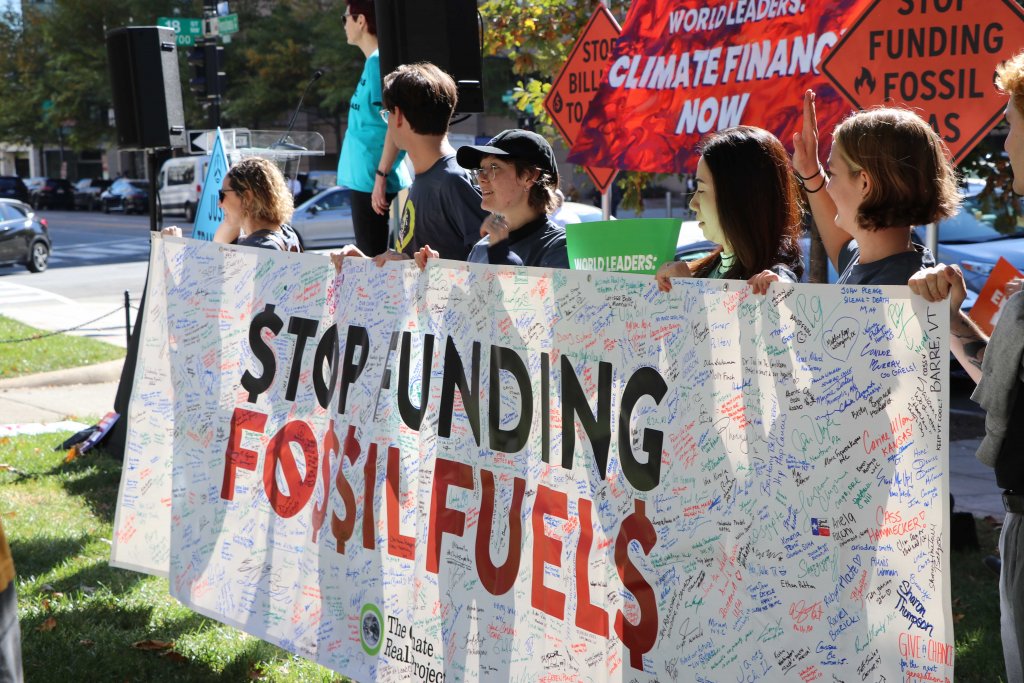
The rally was attended by members of advocacy groups, including The Climate Reality Project. (Hannah Webster/MNS)
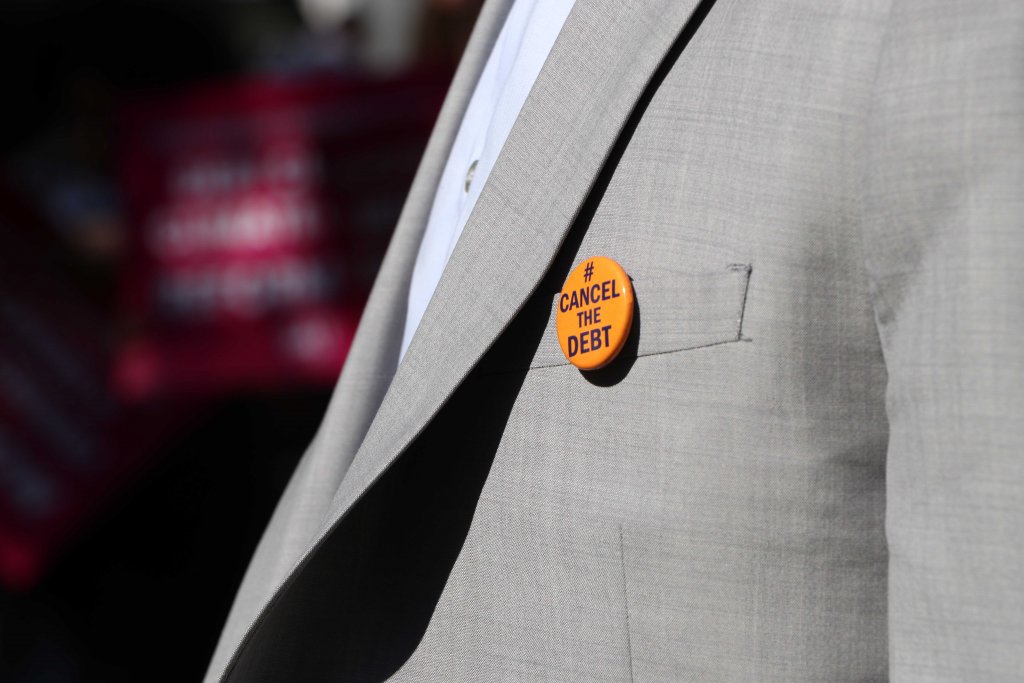
Attendees donned shirts and pins with phrases like “#Cancel The Debt,” “Get your a$$ out of oil and gas,” and “Keep 1.5℃ alive.” (Hannah Webster/MNS)

A speaker representing Stop Financing Factory Farming led the crowd in a chant of “World Bank, put your money where your mouth is.” (Hannah Webster/MNS)
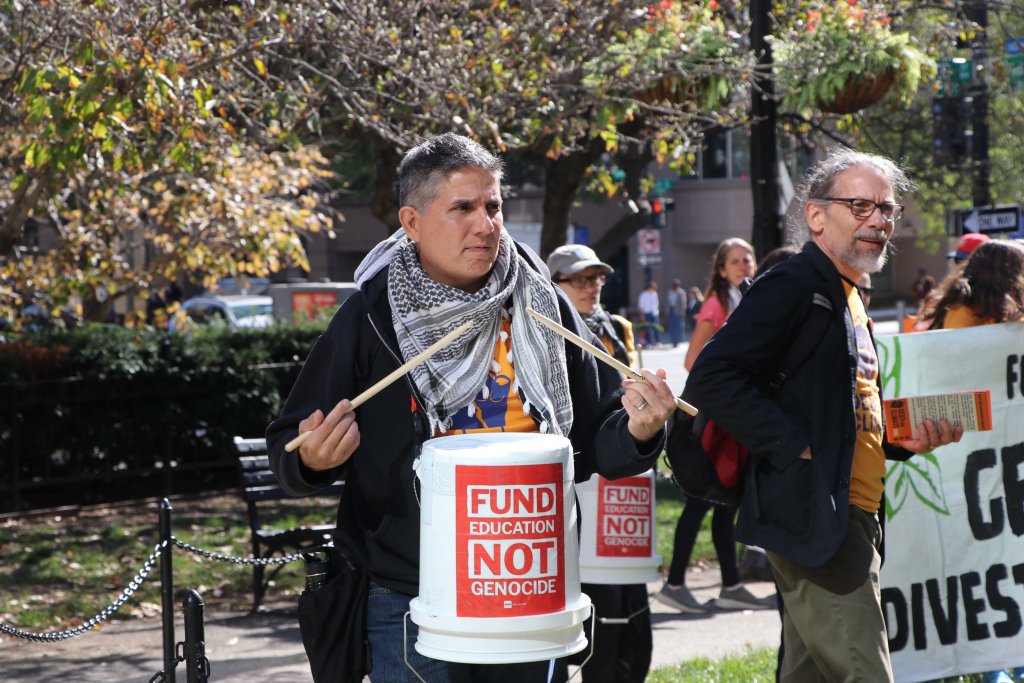
After about an hour of speakers, the group began their march to the White House. (Hannah Webster/MNS)

As they walked, the protesters led cheers, including “World Bank, no thanks” and “What do we want? Climate justice.” (Hannah Webster/MNS)
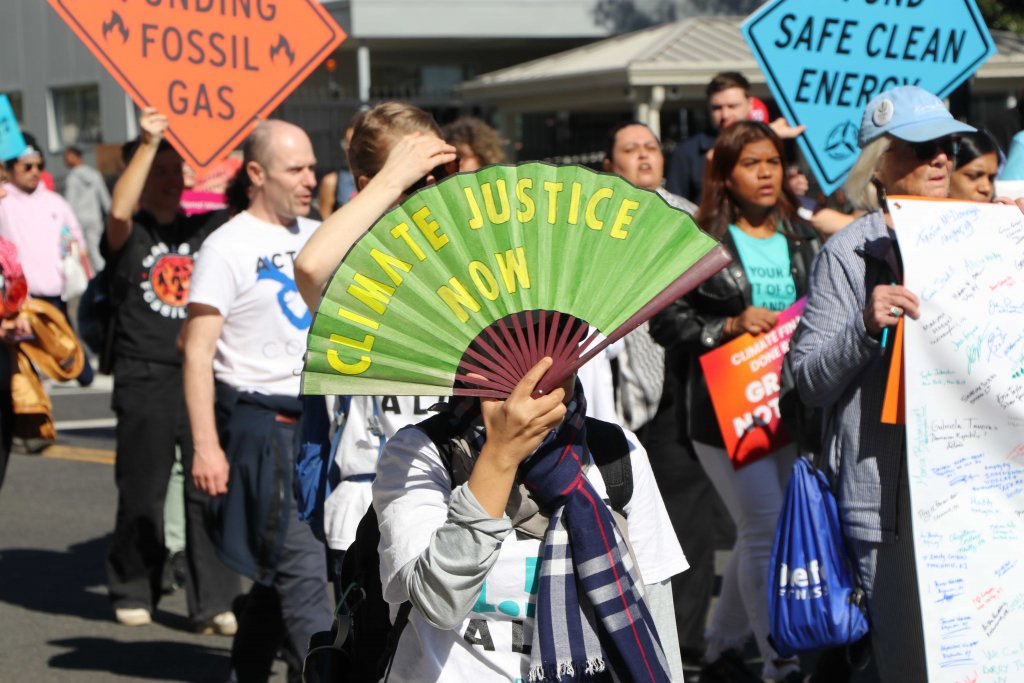
Protesters marched for about 25 minutes, escorted by DC police. (Hannah Webster/MNS)
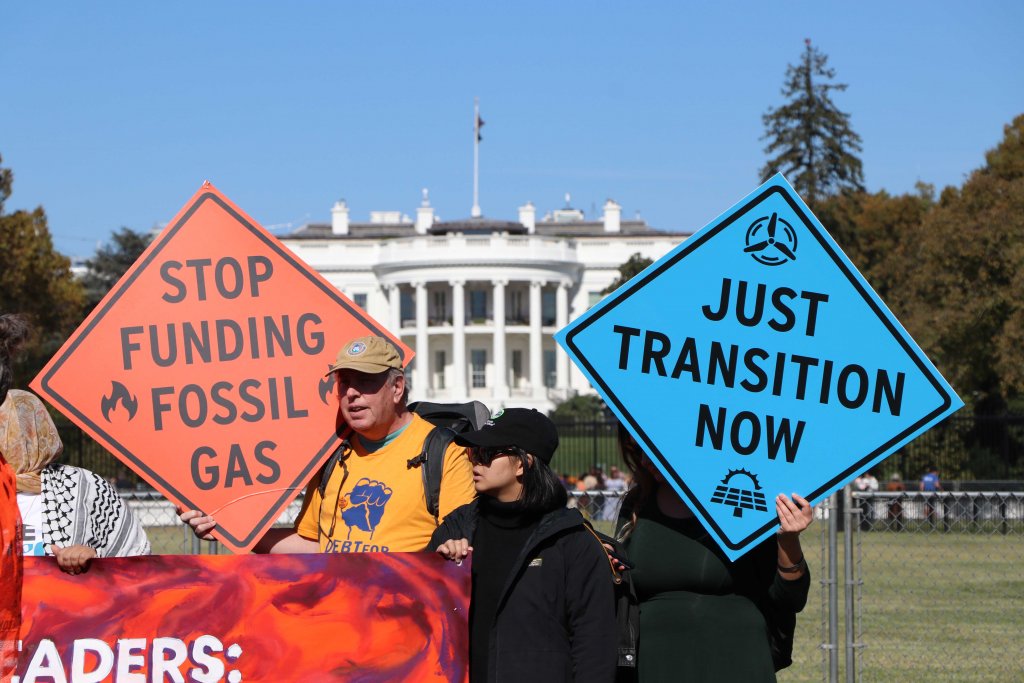
The march ended on the Ellipse, south of the White House. (Hannah Webster/MNS)
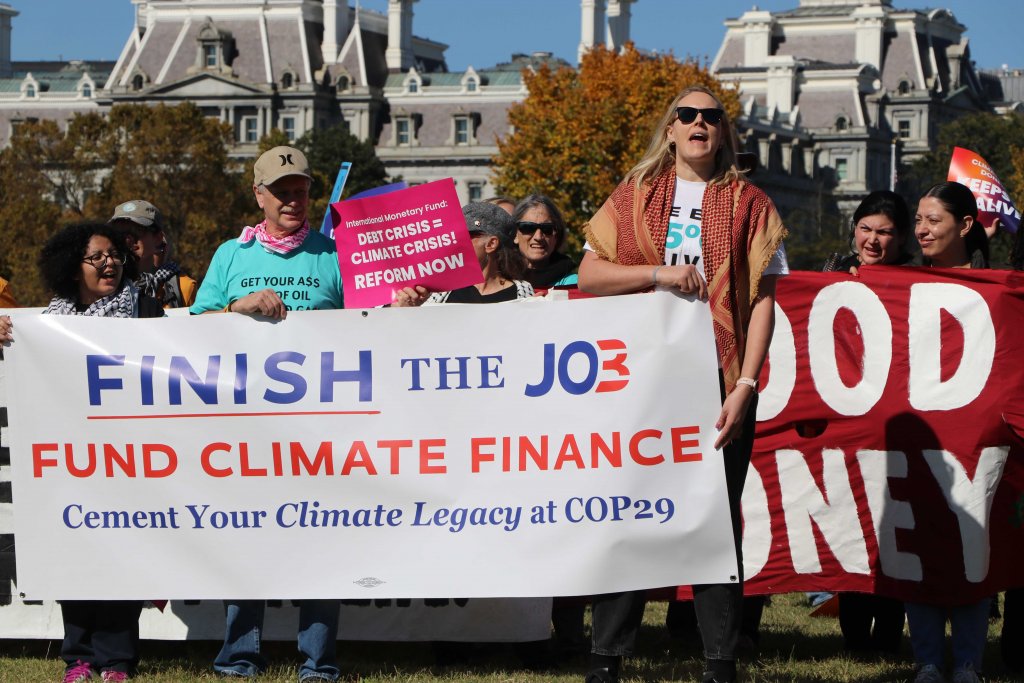
At the Ellipse, speakers commended President Joe Biden’s climate initiatives, while urging further action. (Hannah Webster/MNS)
IMF warns global public debt is nearing over $100 trillion and won’t stop
WASHINGTON — The International Monetary Fund projected global public debt to exceed $100 trillion by the end of 2024 in its bi-annual Fiscal Monitor report, released Wednesday at the Annual Meetings of the World Bank and the IMF.
“Public debt may be worse than it looks.” IMF Director of Fiscal Affairs Vítor Gaspar said at a press briefing Wednesday, noting the propensity for optimism in debt calculations.
The report also predicted that the global debt-to-GDP ratio will approach 100% by the end of the decade, rising above pandemic peak. Public debt is projected to grow faster than the pandemic in about one-third of countries covered by the World Economic Outlook.
High debt levels today raise the risk of financial instability, making economies more vulnerable to negative spillover, especially if borrowing costs rise or revenues fall unexpectedly. They also add higher spreads on future debt levels.
The Fiscal Monitor is prepared by the IMF Fiscal Affairs department and draws from the same database as the World Economic Outlook, which anticipated steady global economic growth, soft landing, and a dip in inflation in its latest report.
Given these circumstances, “most economies are well positioned to deal with fiscal adjustment,” Gaspar said. “The time to act is now.”
The United States and China, the world’s two largest economies, account for a significant share of rising public debt. Taking the U.S. and China out of the equation would drop the global debt-to-GDP ratio by around 20 percentage points, estimated the IMF.
As of Tuesday, U.S. public debt is $35.77 trillion, with $3 billion being added daily, according to Fox Business.
Former IMF Research Department Deputy Director and current Brookings Senior Fellow Gian Maria Milesi-Ferretti said that though U.S. “dynamics are clearly unsustainable,” the U.S. is in a very different position compared some other countries.
“Say, people running from U.S. treasury bonds, or rates spiking up because investors are getting jittery,” he said. “Unless you have a real change in perspective for the U.S. economy, you are unlikely to see that.”
Conversations around fiscal policy are especially relevant as the 2024 U.S. presidential election approaches. Vice President Kamala Harris would increase national debt by $3.50 trillion through 2035, while former President Donald Trump would increase the debt by $7.50 trillion, according to a US Budget Watch analysis of the candidates’ tax and spending plans.
April’s Fiscal Monitor report detailed a look into the ‘Great Election Year,’ with policy-related risks at the forefront of uncertainty.
Gaspar declined to comment on any specific elections at Wednesday’s briefing, but said that the IMF believes the situation in the U.S. is more stable, given that “policymakers have access to many combinations of policy instruments that enable them to put the path of public debt under control.”
“Adjustment in the United States, not only good for the United States, is also good for the rest of the world,” he said.
IMF Deputy Director of Fiscal Affairs Era Dabla-Norris said at the briefing that policymakers are facing a “fiscal policy trilemma”: maintaining sustainability amid very high levels of debt, accommodating spending pressures for private adaptation, and garnering support for reforms.
Poor countries in sub-saharan Africa are most vulnerable, as governments are caught between spending to alleviate poverty and being unable to do so with lower tax and debt-carrying capacity.
Dabla-Norris said that the latest Fiscal Monitor calls for countries to “put their public finances in order” so as to limit public debt risks.
Dabla-Norris also noted that the fiscal efforts need to be “people-focused.” She emphasized that governments needed to “build the trust’ of the taxpayers to ensure that “every dollar that is spent has maximum impact,” because its important to “preserve social spending.”
Doing so would create fiscal space “to combat future shocks surely to come” and will “sustain long-term growth,” she said.


